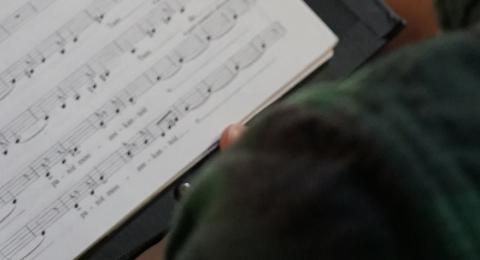Why get a master’s degree in music composition?
The M.A. in music with an option in composition option offers both a broad knowledge of music and the opportunity for in-depth study of music composition. This graduate program encourages mastery of technique and theory, culminating in a final project in an area of interest such as a composition, a composition recital, a lecture recital or a research paper. Our composition faculty’s interests span all styles, periods and approaches, and the program is responsive to the individual ambitions of its students to prepare them for their professional careers.
Why choose UNH for your music degree?
Take advantage of all of the resources of the Music Department, including a wealth of faculty expertise, lectures and performances by acclaimed musicians, conductors, composers and researchers. You can take part in a rich musical life at UNH, including chamber music, choirs, orchestras, bands and jazz bands. Within driving distance of Boston and Portland, UNH is ideally situated to allow you to take advantage of the offerings of the many vibrant musical communities in the area.
Potential career areas
- Academia
- Cinema/theatre
- Composition
- Conducting
- Education
- Music theory
- Performance
- Radio/television
- Research
- Writing
Curriculum & Requirements
Beginning in the 2025-2026 academic year, the Music: Composition M.A. is pausing admissions to the program. Current students will continue to have access to the same high-quality education and resources until they graduate.
The master of arts in composition option offers the opportunity for in-depth study of music composition. Some graduates of the program will go on to earn a doctoral degree in composition or music theory, while others will seek careers as film and theater composers, sound designers, teachers, and freelance writers. The program is responsive to the individual ambitions of its students to prepare them for their professional careers in the best way possible.
This degree program has final approval from the National Association of Schools of Music.
Completion of the program requires a final project in an area of interest. Projects can take several forms (for example, a composition, a composition recital, a lecture recital, a research paper, etc.) and are usually proposed and developed in concert with the graduate studies coordinator and a faculty member who serves as the project adviser. A final oral examination assesses the candidate's ability to apply compositional skills, and/or to describe advanced independent work of particular interest.
All of the Master of Arts in Music options require 30 credit hours as well as a final project for completion of the degree.
| Code | Title | Credits |
|---|---|---|
| Concentration | ||
| MUSI 875 & MUSI 876 | Composition and Composition | 6 |
| MUSI 877 | Advanced Composition | 3 |
| MUSI 891 | Research Seminar | 1-4 |
| Supportive Courses in Music | ||
| MUSI 865 | Introduction to Bibliography | 3 |
| MUSI 894 | Theory Seminar | 3 |
| MUSI 869 | Musicology Seminar 3 | 3 |
| Electives 1 | ||
| Select from the following courses: | 9 | |
Musicology Courses | ||
MUSI 801 | Topics in Music History 3 | |
Conducting | ||
MUSI 831 | Advanced Instrumental Conducting | |
Applied Lessons Courses | ||
MUSI 845 | Graduate Voice | |
MUSI 848 | Graduate Cello | |
MUSI 855 | Graduate Bassoon | |
Other Courses | ||
MUSI 895 | Special Studies 2 | |
MUSI 869 | Musicology Seminar | |
- 1
Normally, electives will be chosen only from offerings within the Department of Music. Students wishing to enroll in electives outside the department are permitted to do so in consultation with the Graduate Coordinator for the Department of Music.
- 2
MUSI 895 Special Studies may be used to enroll in large and studio ensembles for a total of 6 credits.
- 3
MUSI 869 Musicology Seminar and MUSI 801 Topics in Music History can be repeated for credit.
Concentration and Supportive Courses are required; other electives are possible with the approval of the department.
Accelerated Master's Overview
Accelerated Master’s programs offer qualified University of New Hampshire undergraduate students the opportunity to begin graduate coursework in select graduate programs while completing a bachelor’s degree. Accelerated master's programs are designed to provide students with an efficient and cost-effective pathway to earn both a bachelor's and master's degree or graduate certificate, enhancing career opportunities and long-term earning potential.
Accelerated Master's Highlights
- Begin studying advanced topics while an undergraduate student with the opportunity to complete a master’s degree or graduate certificate early.
- Master’s degree program students: Earn up to 12* graduate (800-level) course credits while completing a bachelor’s degree. This coursework will count as dual-credit toward both the bachelor’s and master’s degrees.
- Graduate certificate program students: Earn up to 8* graduate (800-level) course credits while completing a bachelor’s degree. This coursework will count as dual-credit toward both the bachelor’s degree and the graduate certificate.
- Students complete the bachelor’s degree, and then officially matriculate into the master’s or graduate certificate program to complete the remaining required graduate-level coursework.
*Some exceptions apply.
Accelerated Master's Admission Requirements
- A minimum 3.2 cumulative GPA is required.*
- A minimum of 90 undergraduate credits must be completed prior to enrolling in graduate (800-level) courses.
- Streamlined Graduate School Application (two letters of recommendation; most standardized tests and application fee are waived).*
*Some exceptions apply.
Accelerated Master's Requirements
- Students must attend a mandatory orientation session.
- Students must submit a special registration form each semester for dual-credit courses and note any DegreeWorks exceptions.
- Students may defer graduate matriculation for up to one year after earning their bachelor’s degree in most programs.
- See the Accelerated Master’s Catalog Policy and Accelerated Master’s Website for additional information and a list of programs. Note that some programs have additional requirements (e.g. higher-grade expectations) compared to the general policy.
Music: Composition (M.A.) Accelerated Option
This graduate degree program is approved to be taken on an accelerated basis in articulation with the following undergraduate program(s):
| Code | Title | Credits |
|---|---|---|
| Music: Composition (B.A.) | ||
| Music: Music Liberal Studies (B.A.) | ||
| Music: Performance Study (B.A.) | ||
| Composition (B.M.) | ||
| Music Education (B.M.) | ||
| Performance (B.M.) | ||
| Pre-Teaching (B.M.) | ||
| Students select from the following approved 800-level courses that can be completed in the undergraduate senior year for dual credit: | ||
| MUSI 809 | Music of the Romantic Period | 3 |
| MUSI 845 | Graduate Voice | 1 |
| MUSI 848 | Graduate Cello | 1 |
| MUSI 855 | Graduate Bassoon | 1 |
| MUSI 865 | Introduction to Bibliography | 3 |
| MUSI 869 | Musicology Seminar | 3 |
| MUSI 875 | Composition | 1 |
| MUSI 876 | Composition | 1 |
| MUSI 877 | Advanced Composition | 1 |
| MUSI 879 | Reading and Writing Musical Scores | 3 |
| MUSI 894 | Theory Seminar | 3 |
| MUSI 895 | Special Studies | 1 |
| MUED 841 | Techniques and Methods in Choral Music | 2 |
| MUED 891 | Teaching Secondary School Music | 3 |
| MUED 895 | Special Studies | 1 |
Program Learning Outcomes
General Competencies for All Music MA Programs
- Demonstrate advanced capacities to work independently and make effective artistic and intellectual judgments and professional decisions in the area of specialization by producing a final project or equivalent.
- Demonstrate advanced competence in the area of specialization.
Additional Competencies, M.A. in Composition
- Demonstrate advanced competencies in composition.
- Demonstrate advanced knowledge and skills in one or more related fields of music.
- Complete a faculty approved final project.
- Manage an advanced performance of their original composition.
Deadlines
Applications must be completed by the following deadlines in order to be reviewed for admission:
- Fall: Feb. 15 (for funding); April 1 (recommended US; final international); July 1 (final)
- Spring: Dec. 1
- Summer: N/A
- Special: N/A
Application fee: $65
Campus: Durham
New England Regional: CT RI VT
Accelerated Masters: Yes (for more details see the accelerated masters information page)
New Hampshire Residents
Students claiming in-state residency must also submit a Proof of Residence Form. This form is not required to complete your application, but you will need to submit it after you are offered admission, or you will not be able to register for classes.
Transcripts
If you attended UNH or Granite State College (GSC) after September 1, 1991, and have indicated so on your online application, we will retrieve your transcript internally; this includes UNH-Durham, UNH-Manchester, UNH Non-Degree work and GSC.
If you did not attend UNH, or attended prior to September 1, 1991, then you must upload a copy (PDF) of your transcript in the application form. International transcripts must be translated into English.
If admitted, you must then request an official transcript be sent directly to our office from the Registrar's Office of each college/university attended. We accept transcripts both electronically and in hard copy:
- Electronic Transcripts: Please have your institution send the transcript directly to grad.school@unh.edu. Please note that we can only accept copies sent directly from the institution.
- Paper Transcripts: Please send hard copies of transcripts to: UNH Graduate School, Thompson Hall- 105 Main Street, Durham, NH 03824. You may request transcripts be sent to us directly from the institution or you may send them yourself as long as they remain sealed in the original university envelope.
Transcripts from all previous post-secondary institutions must be submitted and applicants must disclose any previous academic or disciplinary sanctions that resulted in their temporary or permanent separation from a previous post-secondary institution. If it is found that previous academic or disciplinary separations were not disclosed, applicants may face denial and admitted students may face dismissal from their academic program.
Letters of recommendation: 3 required
Recommendation letters submitted by relatives or friends, as well as letters older than one year, will not be accepted.
Personal Statement/Essay Questions
Prepare a brief but careful statement regarding:
- Reasons you wish to do graduate work in this field, including your immediate and long-range objectives.
- Your specific research or professional interest and experiences in this field.
Additional Department Requirements
Accelerated Masters program: Applicants must have a minimum 3.4 GPA. Applicants are required to submit 2 letters of reference from UNH Faculty.
Additional Requirements:
Entrance Exam: An exam in music theory and music history is required. The exam will be sent to you upon completion of your on-line application with the graduate school. You are required to arrange for an instructor at your current institution or similarly qualified person to proctor the exam for you. Please contact the Department of Music graduate coordinator for details.
Writing Sample: A sample of academic writing, preferably on a musical subject, should be submitted to the Department of Music graduate coordinator, either electronically (pdf file via email) or in hard copy. This might be a paper that has been submitted for a course.
Composition: Applicants should submit a portfolio of compositions, and arrange for an interview with Professor Andrew Boysen or Professor Michael Annicchiarico.
Important Notes
All applicants are encouraged to contact programs directly to discuss program-specific application questions.
International Applicants
Prospective international students are required to submit TOEFL, IELTS, or equivalent examination scores. English Language Exams may be waived if English is your first language. If you wish to request a waiver, then please visit our Test Scores webpage for more information.





